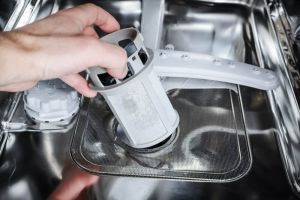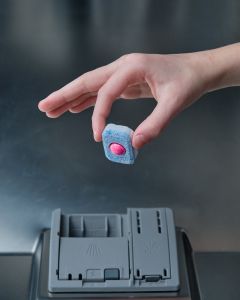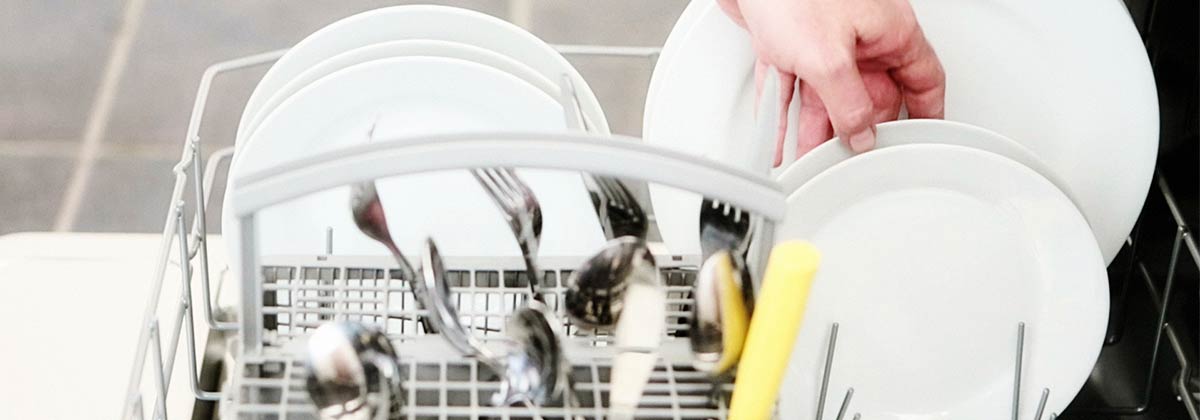It’s easy to fall into the trap of thinking your dishwasher is a self-cleaning appliance. How can it possibly be dirty when it’s the one keeping all your dishes sparkling clean? The reality is that your dishwasher gets less clean with every cycle you run it through, and if you leave it for long enough, it may start affecting how clean your dishes end up. Follow this Canstar Blue cleaning guide to ensure your crockery stays as clean as possible.
What’s in this guide?
Why should you clean a dishwasher?

Your dishwasher will not work properly if it’s clogged with food particles, mineral build-up or detergent residue. This not only reduces the effectiveness of your machine but also encourages germs and bacteria to spread. Cleaning your dishwasher regularly will ensure your appliances stays in top condition and as a bonus, may also extend its lifespan.
How to clean a dishwasher
Follow these steps to remove gunk and grime build-up from inside your dishwasher:
- Switch-off your dishwasher completely before you begin the cleaning process.
- Remove the racks, cutlery baskets, spinning arms and the filter (some filters twist off, but others will require tools to unscrew them).
- Check the removables for food scraps or any sort of scummy build-up. Try using a toothbrush to remove food particles or other debris lodged in nooks and crevices.
- Soak all the removable parts in a mixture of warm water and one cup of white distilled vinegar. Leave them to soak for at least 30 minutes.
- Run a quick cycle with two cups of vinegar thrown in, and stop the machine mid-wash so that the vinegar has a chance to work its magic.
- Leave the dishwasher on pause for 15 to 30 minutes, and then simply let it finish the cycle.
- Sprinkle a cup of baking soda on the bottom of your dishwasher and run it on a short, hot cycle. This will freshen up your dishwasher, brightening the potentially faded interior and removing any stubborn stains.
- Wipe the external face with a warm soapy washcloth, being sure to get rid of any food stains or fingerprints.
Note: Some dishwasher manufacturers advise against using vinegar for cleaning appliances due to its acidity and the risk of potentially damaging sensitive internal parts. It’s best to check your dishwasher’s instruction manual first.
Do dishwasher cleaners work?
Commercially available dishwasher cleaning liquids and tablets are considered the best option to ‘clear out’ your machine’s interior of gunk and foul smells. These products are specially designed to dissolve and remove grease, limescale, detergent build-up, hard water stains and odours – all in one use. Dishwasher cleaning products from brands like Finish, Shine and Somat are relatively cheap and available from most supermarkets. Many will also come with instructions on how to use them effectively.
How often should you clean a dishwasher?

If you use your dishwasher daily or every few days, it’s recommended to clean the appliance at least once a month to maintain its cleaning efficiency and erase any food build-up. Regular upkeep is also advised to extend the lifespan of your machine. Here’s a quick guide:
- Daily: remove any visible food bits inside the machine.
- Weekly: wipe down your dishwasher door and gasket.
- Monthly: deep clean the interior with a dedicated dishwasher cleaner or vinegar.
Cleaning a dishwasher
Cleaning your dishwasher is an important process that is likely to prolong the lifespan of your appliance and eliminate any germs or bacteria that may be lingering. Regular dishwasher maintenance will also improve its everyday performance, ensuring that your dishes are always kept nice and clean. Unfortunately, you can only maintain your dishwasher for so long – eventually you’ll have to purchase a new appliance. If you’re in the market for a new model, check out some of Canstar Blue’s best-rated dishwashers to help you decide which appliance is the best fit for you and your home.




Share this article